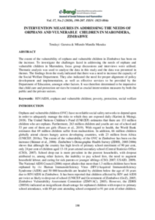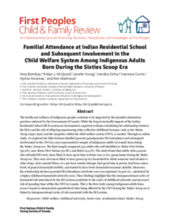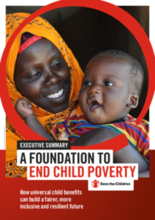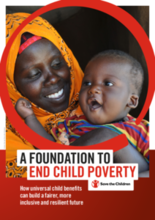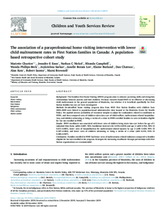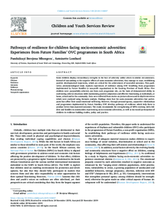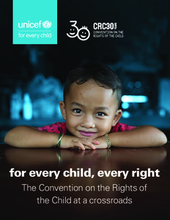Displaying 151 - 160 of 505
To investigate the challenges faced in addressing the needs of orphans and vulnerable children in Marondera, focus group discussions and interviews were utilised. Thematic analysis was used to analyse the data in this study and the data was presented in themes.
Through an online study, the authors of this paper explored the links between familial (parents/grandparents) Indian Residential School (IRS) attendance and subsequent involvement in the child welfare system (CWS) in a non-representative sample of Indigenous adults in Canada born during the Sixties Scoop era.
This report from Save the Children calls upon governments, donors and other development partners to urgently support an expansion in social protection coverage of children and their caregivers (predominantly women).
This report from Save the Children calls upon governments, donors and other development partners to urgently support an expansion in social protection coverage of children and their caregivers (predominantly women), working progressively towards UCBs.
This article investigates the efficacy of the Families First Home Visiting (FFHV) program, which aims to enhance parenting skills and strengthen relationships between parents and their children.
This qualitative, phenomenological study explores experiences of resilience among OVC benefiting from programmes implemented by Future Families (a non-profit organisation) in the Gauteng Province of South Africa.
This study used a dataset of 1426 young adults experiencing homelessness (YAEH) from 7 different US cities to examine the historical risk and resilience characteristics of those involved in foster care alone, juvenile justice alone, both systems (dual status), and no system involvement.
Published in connection with the 30th anniversary of the Convention, this report is intended as an advocacy tool to both celebrate the achievements of the past three decades and generate dialogue on the critical work that remains – especially for children who have been left behind.
This article provides an overview of literature investigating the needs of Indigenous children in residential care facilities in Australia.
The literature examining reunification for American Indian children reveals mixed findings regarding racial differences. Studies that isolate the impact of race on reunification while controlling for other covariates are needed, and this study fills that gap.

